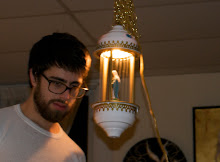Music: "Traversing the Fourth" | EloiSing
Mood: oatmealy
In keeping with the (self)conversation I started in the post All My People, I've been thinking a lot about this question of 'audience' and why I'm having such a hard time coming up with a clear answer as to who I hope reads this book (beyond the fantastical answer: everyone). As I'm slated to turn in my 2nd/final thesis draft in less than a week, I've written up a letter to my committee discussing the changes I've made. I go into the question of audience a bit, and so here it is in all its almost-makes-sense-ness:
A word on audience: S [a committee member] has been concerned, for a while now, whether or not this is a ‘religious’ or, for lack of a better word, ‘secular’ book. She mentioned that she was often uncomfortable with the use of Bible verses, and even the names God, Jesus, etc. Obviously, this is something I’ve been wrestling with for years. In my mind, this is a work of literature that I want everyone to read, regardless if they're atheists, Catholics, or satan-worshippers. I see my use of religious concepts as no different than Eula Biss’ use of research on telephone poles in No Man’s Land, or John McPhee’s research on, well, everything in the world (how does he do it?). The simple answer then, is to make sure I’m explaining things enough to let ‘outsiders’ in.
But there’s a bigger problem here. To get a bit philosophical, I think that my audience is defined by the book’s title. My audience are ‘Sleepers,’ for a number of reasons. In one sense, it is for the people who have had any amount of religious exposure, and have thus been left wondering what it all meant, and even more, how to begin talking about it. In another sense, it is my opinion that America’s capacity to parse religion has fallen asleep. Culturally, you’re either a Falwell or you’re an atheist, and heaven help you if you try to talk about God in any sense beyond the very broad, unassuming higher-power-however-you-choose-to-define-it manner. It is my belief that Christianity, from Catholicism, to Mormonism, and all the other wacky permutations, is the only allowable prejudice left in American culture. And no, I’m not saying that racism, sexism, etc. don’t exist anymore, but they’ve moved into a more disturbing latent form, rather than something professed openly in conversation, media, the classroom. It’s cool to hate Christianity, and laugh at its feeble-mindedness. We’ve gotten hung up on terms, on words that every individual reads their own experience into. To me, this renders the word “Christian” moot and useless. But, what I’ve learned from the few instances where people have indulged in the content of my book is that we’re actually dying to talk about the search for meaning, and not just in the relativistic post-modern sense. So, the title, Wake, Sleeper is a call to myself to start dealing with these issues head-on, as well as, I hope, the same thing for anyone who has ever wondered what happens after death.


My thoughts about writing a book are pretty simple (as are most thoughts in my life) ...what idea or ideas are we feeling compelled to share? Is there any positive "reason" for wanting to share our ideas with other people? Will they (the readers) enjoy or learn from the experience of reading what I've written? (in the case of MY writing, probably not) Are we writing just to get acknowledgement or praise from our readers? Hopefully not. Are we writing because we think it's "art?" (certainly my writing would never be considered art.) So...WHY do you write?
ReplyDelete